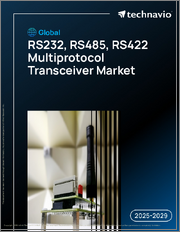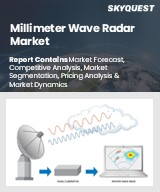
|
시장보고서
상품코드
1642748
자동차용 트랜시버 시장 : 프로토콜, 차종, 용도, 지역별(2025-2033년)Automotive Transceivers Market by Protocol (CAN, LIN, Flexray, and Others), Vehicle Type (Passenger Cars, Commercial Vehicles), Application (Body Electronics, Infotainment, Powertrain, Chassis and Safety), and Region 2025-2033 |
||||||
세계의 자동차용 트랜시버 시장 규모는 2024년에 63억 달러에 달했습니다. 향후 IMARC Group은 2033년까지 시장은 95억 달러에 달하며, 2025-2033년에 4.69%의 성장률(CAGR)을 보일 것으로 예측하고 있습니다. 자동차 산업의 현저한 성장, 소비자의 지출 능력 향상, 광범위한 연구개발(R&D) 활동이 시장을 촉진하는 주요 요인의 하나입니다.
자동차용 트랜시버는 자동차 전기 시스템의 서로 다른 컴포넌트 간의 통신을 가능하게 하기 위해 자동차에 사용되는 전자 장비입니다. 마이크로컨트롤러, 트랜시버 칩, 파워 매니지먼트 유닛(PCU), 발진기로 구성됩니다. 엔진 제어 장비, 변속기 제어 장비, 대시보드, 멀티미디어, 내비게이션, 텔레매틱스, 전동식 파워 스티어링 시스템 등에 널리 사용되고 있습니다. 차량용 트랜시버는 극한의 온도, 진동, 전자기 간섭 등 가혹한 차량 탑재 환경에서 작동하도록 설계되었습니다. 차량용 트랜시버는 차량내 다양한 전자 부품 간의 안정적이고 효율적인 통신을 실현하여 안전하고 편안한 운전 경험을 제공하는 데 도움을 줍니다. 그 결과, 차량용 트랜시버는 승용차 및 상용차에 널리 사용되어 효율성, 안전성, 편안함, 편의성, 성능 향상 등 다양한 이점을 제공합니다.
자동차용 트랜시버 시장 동향 :
세계 자동차 산업의 괄목할 만한 성장은 시장 전망을 밝게 하는 중요한 요인 중 하나입니다. 차량용 트랜시버는 전자 부품 간의 안정적이고 효율적인 통신을 가능하게 하므로 최신 자동차에 널리 사용되고 있습니다. 이에 따라 커넥티드카에 대한 수요가 증가함에 따라 차량용 트랜시버가 널리 사용되면서 시장 성장을 촉진하고 있습니다. 차량용 트랜시버는 차량내 전자 부품 간 신뢰할 수 있고 효율적인 데이터 전송 수단을 제공하여 다른 장비 및 네트워크와의 통신을 가능하게 합니다. 또한 자동차의 효율성, 안전성, 편안함을 향상시킬 수 있는 비용 효율적이고 신뢰할 수 있는 전자 부품에 대한 요구가 증가하고 있는 것도 성장 요인 중 하나입니다. 이와는 별도로 제조업체들은 현대 자동차 산업의 요구를 충족시킬 수 있는 보다 진보되고 효율적인 트랜시버 개발에 주력하고 있으며, 이는 시장 성장을 가속하고 있습니다. 또한 충돌 방지 시스템, 어댑티브 크루즈 컨트롤과 같은 첨단 안전 기능을 갖춘 고급 차량에 대한 제품 채택이 확대되고 있는 것도 시장 성장에 탄력을 받고 있습니다. 또한 소형화된 차량용 트랜시버 도입에 대한 선호도가 높아지면서 최신 자동차에 쉽게 장착할 수 있는 점도 시장 성장에 긍정적인 영향을 미치고 있습니다. 기타 요인으로는 소비자의 지출 능력 증가, 인포테인먼트 및 멀티미디어 기술에 대한 수요 증가, 광범위한 연구개발 활동, 전기자동차 및 하이브리드차에 대한 수요 증가 등이 시장 성장의 원동력이 될 것으로 예상됩니다.
이 보고서에서 다룬 주요 질문
- 세계 차량용 트랜시버 시장은 지금까지 어떻게 성장하며 왔는가?
- 세계 차량용 트랜시버 시장 성장 촉진요인, 억제요인 및 기회는?
- 촉진요인, 억제요인, 기회가 세계 자동차 트랜시버 시장에 미치는 영향은?
- 주요 지역 시장은?
- 가장 매력적인 차량용 트랜시버 시장은 어느 국가인가?
- 프로토콜에 따른 시장 분석은?
- 차량용 트랜시버 시장에서 가장 매력적인 프로토콜은?
- 차종별 시장 현황은?
- 차량용 트랜시버 시장에서 가장 매력적인 차종은?
- 세계 자동차 트랜시버 시장 경쟁 구도는?
- 용도별 시장 분석은?
- 차량용 트랜시버 시장에서 가장 매력적인 용도는 무엇인가?
- 세계 차량용 트랜시버 시장의 주요 기업은?
목차
제1장 서문
제2장 조사 범위와 조사 방법
- 조사의 목적
- 이해관계자
- 데이터 소스
- 1차 정보
- 2차 정보
- 시장 추정
- 보텀업 어프로치
- 톱다운 어프로치
- 조사 방법
제3장 개요
제4장 서론
- 개요
- 주요 업계 동향
제5장 세계의 자동차용 트랜시버 시장
- 시장 개요
- 시장 실적
- COVID-19의 영향
- 시장 예측
제6장 시장 내역 : 프로토콜별
- CAN
- 시장 동향
- 시장 예측
- LIN
- 시장 동향
- 시장 예측
- Flexray
- 시장 동향
- 시장 예측
- 기타
- 시장 동향
- 시장 예측
제7장 시장 내역 : 차종별
- 승용차
- 시장 동향
- 시장 예측
- 상용차
- 시장 동향
- 시장 예측
제8장 시장 내역 : 용도별
- 보디 일렉트로닉스
- 시장 동향
- 주요 부문
- 보디 컨트롤 모듈
- HVAC
- 대시보드
- 기타
- 시장 예측
- 인포테인먼트
- 시장 동향
- 주요 부문
- 멀티미디어
- 내비게이션
- 텔레매틱스
- 기타
- 시장 예측
- 파워트레인
- 시장 동향
- 주요 부문
- 엔진 관리 시스템
- 자동변속기
- 시장 예측
- 섀시와 안전성
- 시장 동향
- 주요 부문
- 전동 파워 스티어링
- ADAS/자율 운전
- 시장 예측
제9장 시장 내역 : 지역별
- 북미
- 미국
- 캐나다
- 아시아태평양
- 중국
- 일본
- 인도
- 한국
- 호주
- 인도네시아
- 기타
- 유럽
- 독일
- 프랑스
- 영국
- 이탈리아
- 스페인
- 러시아
- 기타
- 라틴아메리카
- 브라질
- 멕시코
- 기타
- 중동 및 아프리카
- 시장 동향
- 시장 내역 : 국가별
- 시장 예측
제10장 촉진요인·억제요인·기회
- 개요
- 촉진요인
- 억제요인
- 기회
제11장 밸류체인 분석
제12장 Porter's Five Forces 분석
- 개요
- 바이어의 교섭력
- 공급 기업의 교섭력
- 경쟁의 정도
- 신규 진출업체의 위협
- 대체품의 위협
제13장 가격 분석
제14장 경쟁 구도
- 시장 구조
- 주요 기업
- 주요 기업의 개요
- Analog Devices Inc
- Elmos Semiconductor
- Infineon Technologies AG
- Melexis(Xtrion N.V.)
- Microchip Technology Inc
- National Instruments Corporation
- NXP Semiconductors N.V.
- Renesas Electronics Corporation
- Robert Bosch Gesellschaft mit beschrankter Haftung
- Rohm Semiconductor
- STMicroelectronics N.V.
- Texas Instruments Incorporated
The global automotive transceivers market size reached USD 6.3 Billion in 2024. Looking forward, IMARC Group expects the market to reach USD 9.5 Billion by 2033, exhibiting a growth rate (CAGR) of 4.69% during 2025-2033. The significant growth in the automotive industry, rising expenditure capacities of consumers, and extensive research and development (R&D) activities represent some of the key factors driving the market.
Automotive transceivers are electronic devices that are used in vehicles to enable communication between different components of the vehicle's electrical system. They consist of microcontrollers, transceiver chips, power management units (PCU), and oscillators. They are widely used engine control units, transmission control units, dashboards, multimedia, navigation, telematics, and electric power steering systems. Automotive transceivers are designed to operate in harsh automotive environments, including extreme temperatures, vibration, and electromagnetic interference. They help to ensure reliable and efficient communication between the various electronic components in the vehicle, helping to provide a safe and comfortable driving experience. As a result, automotive transceivers are widely used in passenger cars and commercial vehicles and offer a range of advantages, such as improved efficiency, safety, comfort, convenience, and performance.
Automotive Transceivers Market Trends:
The significant growth in the automotive industry across the globe is one of the key factors creating a positive outlook for the market. Automotive transceivers are widely used in modern vehicles to enable reliable and efficient communication between electronic components. In line with this, the widespread utilization of automotive transceivers owing to the increasing demand for connected cars is favoring the market growth. Automotive transceivers enable communication with other devices and networks by providing a reliable and efficient means of transmitting data between electronic components in a vehicle. Moreover, the increasing need for cost-effective and reliable electronic components that can improve the efficiency, safety, and comfort of vehicles is acting as another growth including factor. Apart from this, manufacturers are focusing on the development of more advanced and efficient transceivers that can meet the needs of the modern automotive industry, which in turn is propelling the market growth. Additionally, the widespread product adoption in luxury vehicles that include advanced safety features, such as collision avoidance systems and adaptive cruise control features, is providing an impetus to the market growth. Furthermore, the increasing inclination towards the introduction of miniaturized automotive transceivers that are smaller and more compact, which makes them easier to integrate into modern vehicles, is positively influencing the market growth. Other factors, including rising expenditure capacities of consumers, growing demand for infotainment and multimedia technologies, extensive research and development (R&D) activities, and increasing demand for electric and hybrid vehicles, are anticipated to drive the market growth.
Key Market Segmentation:
Protocol Insights:
- CAN
- LIN
- Flexray
- Others
Vehicle Type Insights:
- Passenger Cars
- Commercial Vehicles
Application Insights:
- Body Electronics
- Body Control Module
- HVAC
- Dashboard
- Others
- Infotainment
- Multimedia
- Navigation
- Telematics
- Others
- Powertrain
- Engine Management System
- Auto Transmission
- Chassis and Safety
- Electric Power Steering
- ADAS/Autonomous Driving
Regional Insights:
- North America
- United States
- Canada
- Europe
- Germany
- France
- United Kingdom
- Italy
- Spain
- Russia
- Others
- Asia Pacific
- China
- Japan
- India
- South Korea
- Australia
- Indonesia
- Others
- Latin America
- Brazil
- Mexico
- Others
- Middle East and Africa
- The report has also provided a comprehensive analysis of all the major regional markets, which include North America (the United States and Canada); Europe (Germany, France, the United Kingdom, Italy, Spain, Russia, and others); Asia Pacific (China, Japan, India, South Korea, Australia, Indonesia, and others); Latin America (Brazil, Mexico, and others); and the Middle East and Africa. According to the report, Asia Pacific was the largest market for automotive transceivers. Some of the factors driving the Asia Pacific automotive transceivers market included extensive research and development (R&D) activities, rising expenditure capacities of consumers, and rapid technological advancements.
Competitive Landscape:
- The report has also provided a comprehensive analysis of the competitive landscape in the global automotive transceivers market. Detailed profiles of all major companies have also been provided. Some of the companies covered include Analog Devices Inc, Elmos Semiconductor, Melexis (Xtrion N.V.), Microchip Technology Inc, National Instruments Corporation, NXP Semiconductors N.V., Renesas Electronics Corporation, Robert Bosch Gesellschaft mit beschrankter Haftung, Rohm Semiconductor, STMicroelectronics N.V., Texas Instruments Incorporated, etc. Kindly note that this only represents a partial list of companies, and the complete list has been provided in the report.
Key Questions Answered in This Report:
- How has the global automotive transceivers market performed so far, and how will it perform in the coming years?
- What are the drivers, restraints, and opportunities in the global automotive transceivers market?
- What is the impact of each driver, restraint, and opportunity on the global automotive transceivers market?
- What are the key regional markets?
- Which countries represent the most attractive automotive transceivers market?
- What is the breakup of the market based on the protocol?
- Which is the most attractive protocol in the automotive transceivers market?
- What is the breakup of the market based on the vehicle type?
- Which is the most attractive vehicle type in the automotive transceivers market?
- What is the competitive structure of the global automotive transceivers market?
- What is the breakup of the market based on the application?
- Which is the most attractive application in the automotive transceivers market?
- Who are the key players/companies in the global automotive transceivers market?
Table of Contents
1 Preface
2 Scope and Methodology
- 2.1 Objectives of the Study
- 2.2 Stakeholders
- 2.3 Data Sources
- 2.3.1 Primary Sources
- 2.3.2 Secondary Sources
- 2.4 Market Estimation
- 2.4.1 Bottom-Up Approach
- 2.4.2 Top-Down Approach
- 2.5 Forecasting Methodology
3 Executive Summary
4 Introduction
- 4.1 Overview
- 4.2 Key Industry Trends
5 Global Automotive Transceivers Market
- 5.1 Market Overview
- 5.2 Market Performance
- 5.3 Impact of COVID-19
- 5.4 Market Forecast
6 Market Breakup by Protocol
- 6.1 CAN
- 6.1.1 Market Trends
- 6.1.2 Market Forecast
- 6.2 LIN
- 6.2.1 Market Trends
- 6.2.2 Market Forecast
- 6.3 Flexray
- 6.3.1 Market Trends
- 6.3.2 Market Forecast
- 6.4 Others
- 6.4.1 Market Trends
- 6.4.2 Market Forecast
7 Market Breakup by Vehicle Type
- 7.1 Passenger Cars
- 7.1.1 Market Trends
- 7.1.2 Market Forecast
- 7.2 Commercial Vehicles
- 7.2.1 Market Trends
- 7.2.2 Market Forecast
8 Market Breakup by Application
- 8.1 Body Electronics
- 8.1.1 Market Trends
- 8.1.2 Key Segments
- 8.1.2.1 Body Control Module
- 8.1.2.2 HVAC
- 8.1.2.3 Dashboard
- 8.1.2.4 Others
- 8.1.3 Market Forecast
- 8.2 Infotainment
- 8.2.1 Market Trends
- 8.2.2 Key Segments
- 8.2.2.1 Multimedia
- 8.2.2.2 Navigation
- 8.2.2.3 Telematics
- 8.1.2.4 Others
- 8.2.3 Market Forecast
- 8.3 Powertrain
- 8.3.1 Market Trends
- 8.3.2 Key Segments
- 8.3.2.1 Engine Management System
- 8.3.2.2 Auto Transmission
- 8.3.3 Market Forecast
- 8.4 Chassis and Safety
- 8.4.1 Market Trends
- 8.4.2 Key Segments
- 8.4.2.1 Electric Power Steering
- 8.4.2.2 ADAS/Autonomous Driving
- 8.4.3 Market Forecast
9 Market Breakup by Region
- 9.1 North America
- 9.1.1 United States
- 9.1.1.1 Market Trends
- 9.1.1.2 Market Forecast
- 9.1.2 Canada
- 9.1.2.1 Market Trends
- 9.1.2.2 Market Forecast
- 9.1.1 United States
- 9.2 Asia-Pacific
- 9.2.1 China
- 9.2.1.1 Market Trends
- 9.2.1.2 Market Forecast
- 9.2.2 Japan
- 9.2.2.1 Market Trends
- 9.2.2.2 Market Forecast
- 9.2.3 India
- 9.2.3.1 Market Trends
- 9.2.3.2 Market Forecast
- 9.2.4 South Korea
- 9.2.4.1 Market Trends
- 9.2.4.2 Market Forecast
- 9.2.5 Australia
- 9.2.5.1 Market Trends
- 9.2.5.2 Market Forecast
- 9.2.6 Indonesia
- 9.2.6.1 Market Trends
- 9.2.6.2 Market Forecast
- 9.2.7 Others
- 9.2.7.1 Market Trends
- 9.2.7.2 Market Forecast
- 9.2.1 China
- 9.3 Europe
- 9.3.1 Germany
- 9.3.1.1 Market Trends
- 9.3.1.2 Market Forecast
- 9.3.2 France
- 9.3.2.1 Market Trends
- 9.3.2.2 Market Forecast
- 9.3.3 United Kingdom
- 9.3.3.1 Market Trends
- 9.3.3.2 Market Forecast
- 9.3.4 Italy
- 9.3.4.1 Market Trends
- 9.3.4.2 Market Forecast
- 9.3.5 Spain
- 9.3.5.1 Market Trends
- 9.3.5.2 Market Forecast
- 9.3.6 Russia
- 9.3.6.1 Market Trends
- 9.3.6.2 Market Forecast
- 9.3.7 Others
- 9.3.7.1 Market Trends
- 9.3.7.2 Market Forecast
- 9.3.1 Germany
- 9.4 Latin America
- 9.4.1 Brazil
- 9.4.1.1 Market Trends
- 9.4.1.2 Market Forecast
- 9.4.2 Mexico
- 9.4.2.1 Market Trends
- 9.4.2.2 Market Forecast
- 9.4.3 Others
- 9.4.3.1 Market Trends
- 9.4.3.2 Market Forecast
- 9.4.1 Brazil
- 9.5 Middle East and Africa
- 9.5.1 Market Trends
- 9.5.2 Market Breakup by Country
- 9.5.3 Market Forecast
10 Drivers, Restraints, and Opportunities
- 10.1 Overview
- 10.2 Drivers
- 10.3 Restraints
- 10.4 Opportunities
11 Value Chain Analysis
12 Porters Five Forces Analysis
- 12.1 Overview
- 12.2 Bargaining Power of Buyers
- 12.3 Bargaining Power of Suppliers
- 12.4 Degree of Competition
- 12.5 Threat of New Entrants
- 12.6 Threat of Substitutes
13 Price Analysis
14 Competitive Landscape
- 14.1 Market Structure
- 14.2 Key Players
- 14.3 Profiles of Key Players
- 14.3.1 Analog Devices Inc
- 14.3.1.1 Company Overview
- 14.3.1.2 Product Portfolio
- 14.3.1.3 Financials
- 14.3.1.4 SWOT Analysis
- 14.3.2 Elmos Semiconductor
- 14.3.2.1 Company Overview
- 14.3.2.2 Product Portfolio
- 14.3.2.3 Financials
- 14.3.2.4 SWOT Analysis
- 14.3.3 Infineon Technologies AG
- 14.3.3.1 Company Overview
- 14.3.3.2 Product Portfolio
- 14.3.3.3 Financials
- 14.3.3.4 SWOT Analysis
- 14.3.4 Melexis (Xtrion N.V.)
- 14.3.4.1 Company Overview
- 14.3.4.2 Product Portfolio
- 14.3.5 Microchip Technology Inc
- 14.3.5.1 Company Overview
- 14.3.5.2 Product Portfolio
- 14.3.5.3 Financials
- 14.3.5.4 SWOT Analysis
- 14.3.6 National Instruments Corporation
- 14.3.6.1 Company Overview
- 14.3.6.2 Product Portfolio
- 14.3.6.3 Financials
- 14.3.6.4 SWOT Analysis
- 14.3.7 NXP Semiconductors N.V.
- 14.3.7.1 Company Overview
- 14.3.7.2 Product Portfolio
- 14.3.7.3 Financials
- 14.3.7.4 SWOT Analysis
- 14.3.8 Renesas Electronics Corporation
- 14.3.8.1 Company Overview
- 14.3.8.2 Product Portfolio
- 14.3.8.3 Financials
- 14.3.8.4 SWOT Analysis
- 14.3.9 Robert Bosch Gesellschaft mit beschrankter Haftung
- 14.3.9.1 Company Overview
- 14.3.9.2 Product Portfolio
- 14.3.9.3 SWOT Analysis
- 14.3.10 Rohm Semiconductor
- 14.3.10.1 Company Overview
- 14.3.10.2 Product Portfolio
- 14.3.10.3 Financials
- 14.3.10.4 SWOT Analysis
- 14.3.11 STMicroelectronics N.V.
- 14.3.11.1 Company Overview
- 14.3.11.2 Product Portfolio
- 14.3.12 Texas Instruments Incorporated
- 14.3.12.1 Company Overview
- 14.3.12.2 Product Portfolio
- 14.3.12.3 Financials
- 14.3.12.4 SWOT Analysis
- 14.3.1 Analog Devices Inc
Kindly note that this only represents a partial list of companies, and the complete list has been provided in the report.



















